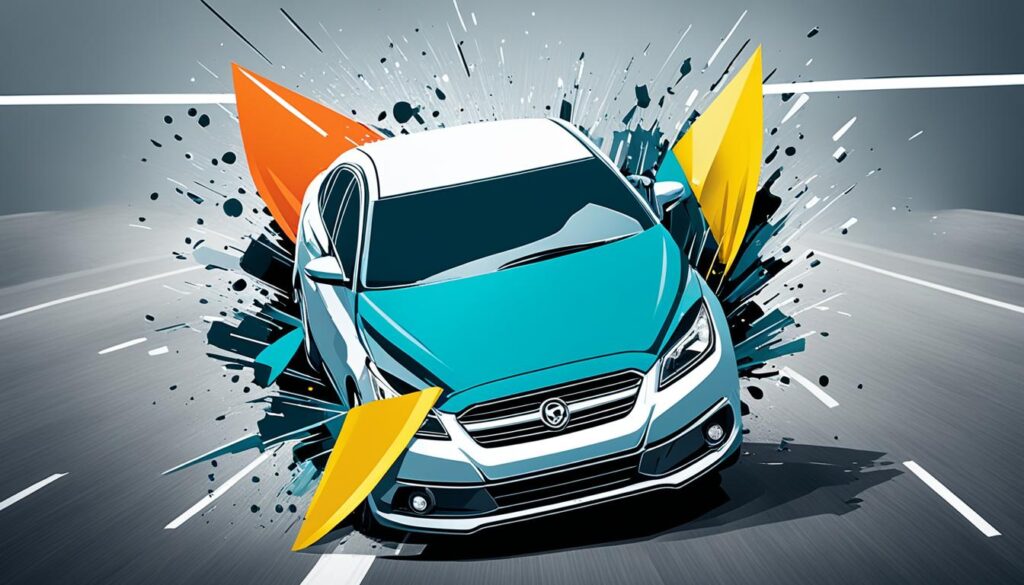When you’re driving, your car is more than just a way to get around. It shows off your hard work, stands for your freedom, and is key to your daily life. But what if something unexpected happens and your car gets into a collision? That’s where collision coverage comes in. It acts as a safety net for your car and gives you peace of mind while driving.

Key Takeaways
- Collision coverage helps pay for repairs or replacement of your vehicle if it’s involved in an accident with another car or object.
- Lenders often require collision coverage for leased or financed vehicles, ensuring your investment is protected.
- The deductible you choose for collision coverage can impact your monthly premiums, so consider your budget and risk tolerance.
- Collision coverage becomes less valuable as your vehicle ages and depreciates, so it may be worth re-evaluating your needs over time.
- Comprehensive coverage, which protects against non-collision incidents like theft or natural disasters, is often a complementary coverage to collision insurance.
What is Collision Coverage?
Collision insurance helps pay for repairs or a new vehicle if it gets damaged in an accident. It covers crashes with other cars, or hitting things like trees or parked cars. Even if you crash into something alone, like losing control and hitting a tree, it can help.
But remember, collision insurance does not cover hitting animals or damaging someone else’s car. For those cases, you’ll need comprehensive and liability coverage.
Vehicles Covered by Collision Insurance
Many vehicles can have collision insurance, including:
- Cars
- Motorcycles
- Boats
- RVs
Some states don’t require collision insurance, but lenders might if you have a loan or lease. Even if not needed, it’s smart for newer or pricier cars. It helps avoid big repair costs after an accident.
Deciding on collision coverage depends on your car’s value, your savings, and if it will sit idle. Knowing what collision insurance covers and doesn’t helps you choose the best coverage for you.
Collision Coverage: Is It Worth It?
Thinking about whether collision coverage is good for your car involves looking at a few things. These include the car’s value, if you can pay for repairs or a new car yourself, and how long it might take to fix or replace the vehicle.
If your car is new or still has a lot of value, getting collision coverage might be a smart move. It can cover expensive repairs or a new car if your vehicle gets damaged. But, if your car is old and not worth much, collision coverage might not be as useful.
Also, think about your money situation. If you couldn’t afford to fix or replace your car after an accident, collision coverage could be a big help. It can ease your mind by covering car repair costs and vehicle damage.
| Collision Coverage | Average Annual Cost |
|---|---|
| Nationwide Average | $814 |
| California | $501.64 |
| Wisconsin | $244.82 |
The average cost of collision insurance can change a lot based on where you live, your driving record, and your car’s value. For instance, drivers in some cities might file more collision claims, which can raise insurance prices.
So, deciding on collision coverage depends on your own situation and what you need. If you have an old car and can easily pay for repairs or a new one, you might not need collision coverage. But, if your car is newer or you need it for getting around, collision coverage could be a good choice. It offers accident protection and liability coverage.
“Collision coverage is an important consideration for drivers, as it can help protect them from the financial burden of vehicle damage and repair costs. However, the decision to carry it should be based on the individual’s specific circumstances and needs.”
Conclusion
Collision coverage is key for drivers to protect their cars and wallets after accidents. It’s not a must-have everywhere, but your lender might ask for it if you’re leasing or financing your car. This coverage helps pay for repairs or a new car after many types of accidents, like hitting another car or just an accident by yourself.
Think about your car’s value, if you can afford repairs, and how much you drive when deciding if collision coverage is right for you. It offers great protection and peace of mind on the road. Plus, you can pick your deductible amount to match your budget.
Choosing collision coverage is a personal choice, but for many, it’s a smart move to protect their car and money in case of an accident. By knowing what collision coverage includes, like deductibles and what it covers, you can pick the best policy for your driving and insurance needs.
FAQ
What is collision coverage?
Collision coverage is a type of insurance. It pays to fix or replace your vehicle if it hits something or gets hit by another car. You don’t have to have it, but your lender might ask if you’re leasing or financing your car.
What types of vehicles are covered by collision insurance?
Many vehicles can have collision insurance, like cars, motorcycles, boats, and RVs. It’s a good idea for new drivers or those who drive a lot. It helps protect your investment.
What does collision coverage pay for?
Collision coverage helps pay for repairs or a new vehicle after accidents. This includes accidents with other cars, stationary objects, or while parked. But, it doesn’t cover hitting animals or injuries to others. That’s what liability coverage is for.
Is collision coverage worth it for my vehicle?
Think about your vehicle’s value, if you could afford repairs or a new car, and if it will sit still for a long time. If your car is new or still valuable, it might be smart to have collision coverage. It can cover expensive repairs or a new car. But, if your car is old and not worth much, it might not be as useful.